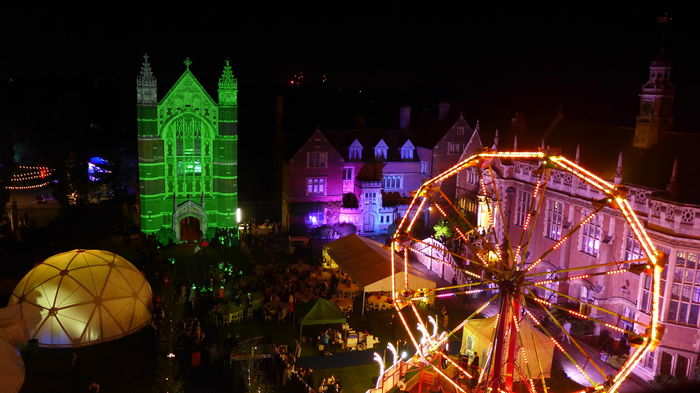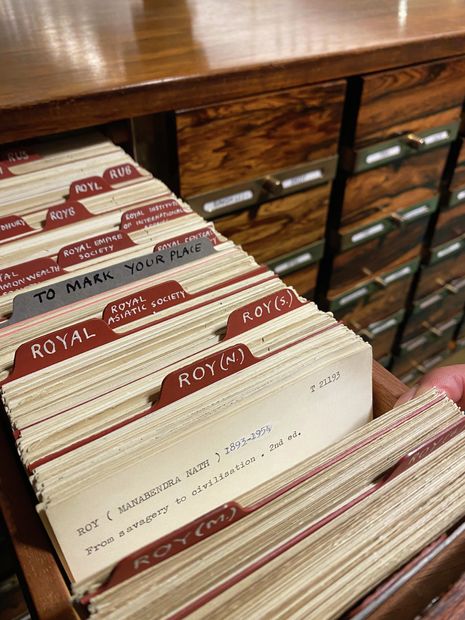The Cambridge Majlis: Historic debates, police reports, and South Asian quotas
‘With Majlis, I felt like I didn’t have to pick and choose parts of my identity’: Majlis president Sara Saloo talks about the revival and future of the famous South Asian society
A few days before speaking to Sara Saloo, the President of the Cambridge Majlis, I went for my first ever Majlis event. Behind the imposing doors of the Old Divinity building at St John’s, the committee had created a cosy space. It was an incredible atmosphere – South Asians (and some non-South Asians) from across the university had turned up, a smattering of brightly coloured traditional wear in the sea of puffer jackets and sweaters, and an unmistakable stream of belly laughs and chatter filling the room with a warm, familiar glow.
I spoke to Saloo about reviving the Cambridge Majlis and what makes the society a special place for those interested in South Asian politics, culture, and other discussions. “Majlis is a historic and prestigious debating society that focuses on South Asia. It has hosted some of Cambridge’s and South Asia’s greatest minds, including Amartya Sen (who was president when he was a student at Trinity College), Mahatma Gandhi, Mohammad Ali Jinnah, and non-South Asian speakers such as Keynes and EM Foster. It was founded in 1891 by the people who would go on to be the leaders of the independence movement in India. Majlis was a forum for knowledge sharing and debating for quite a long time.”
Despite its historical fame, the society has not been heard of for the past few decades, dwindling away after its prime in the mid-20th century. “After the partition of Pakistan and what is now known as Bangladesh, around 1971, the society filtered away due to lots of divisions. Since Majlis was supposed to be a society that unites people from different parts of the subcontinent, it simply wasn’t working very well.”
“In 2018, a couple of students who were looking at the archives discovered the history of the Majlis and decided to revive it. Now, we are trying to recover some of the legacy of the Majlis that has been lost.”
“The Metropolitan Police kept detailed records on everything that the Cambridge Majlis did”
And the legacy of the Majlis is a formidable one, having been a forum for some of the most influential speakers, people and debates that would change the course of history for the Indian subcontinent. “It is always important to us to retain the history of what the Majlis was – there was clearly something amazing about it that made it last for almost a century. But, while we want to stay true to those roots, we also want to bring it into the 21st century and make it relevant for our members.”
“When students looking into archives found out about the historical Majlis, they realised that this was something that was missing.”
It seems crucial that the Majlis was able to revive itself and garner significant interest in a time when South Asians of all identities have had to face some difficult questions. “In the last decade, there has been a tendency to move towards division rather than unity. In the subcontinent and in our home, we see a lot of those divisions, a lot of people withdrawing into their specific communities. While community is great, it’s also very refreshing to have a forum open to all people.”
“We have a surprisingly strong history, but also a history of being alienated”
For Saloo, Majlis has been that uniquely open space. “For a lot of people, when you come to Cambridge you feel like you have to pick one thing; for example, you pick India soc or Pak soc. When I came to Cambridge I picked Pak soc even though I’m Indian, because I was Muslim. I regretted this later and wished I had picked India soc as well. With Majlis, I felt like I didn’t have to pick and choose parts of my identity.”
One of the most interesting things about the society is that its openness today is perhaps directly related to the historical role Majlis played in fighting for its place at Cambridge, and in the world. While doing archival work in the British Library in London, Saloo found “a bunch of police surveillance reports. The Metropolitan Police kept detailed records, probably more detailed than the society minutes themselves, on everything that the Cambridge Majlis did because it was being monitored for spurring anti-colonial activities. For the Majlis, it was just a place to talk, but for the white establishment, it was this site of dissidence.”

In conversation with this year’s May Ball presidents
In some ways, by simply creating a space for themselves, the members of Majlis were dissenting against British rule. The archives show us that despite being surrounded by looming portraits of old white men, it is undeniable that South Asians have a history in Cambridge. “We have a surprisingly strong history, but also a history of being alienated. We recently found out about the ‘Indian problem’ at Cambridge. On 19 March 1909, politicians and the people in charge at Cambridge met to discuss the fact that there was a large number of Indian students coming to Cambridge. They all agreed they were going to place a limit on the number of Indian students that could be taken into each college to stop this from happening. The interesting part was that the master of Downing College refused to reject Indians on the basis of quotas. This was 100 years ago and continued for quite a while. It’s incredible that despite this history, Indians have managed to form such a strong and influential community.”
While being a space of revolt, the historical Majlis was also an intellectually elite and privileged space. I ask Saloo how the revived Majlis will tackle this: “Breaking away from the intellectual tag is very important to me. I come from a very working-class, industrial Northern community. Some of the debate motions at Majlis have tended to be niche in a bad way. We want to move towards discussions that are very relevant to the everyday South Asian and student, to something that matters to us. One of the motions we’ll debate in Week Six is on the impacts of being raised in the diaspora. The motion we just debated on the state of Indian democracy is something we have all discussed – it’s very topical if you are South Asian.”

Majlis has been involved in helping out the South Asian community beyond the debate forum. “At the start of the COVID pandemic, there was a collaboration between five South Asian societies. We lead the collaboration, finding grassroots organisations that were going to provide immediate relief to the migrant workers on the ground in India.”
Saloo and other Majlis committee members speak fondly of the society, passionate about its history and hopeful for its future. It is a fondness I understand – one born out of familiarity and pride, friendship and learning. The old Majlis was a bulwark of South Asian history at Cambridge. However, with its revival rooted in openness, access, and dynamic discussion, I can see why Majlis is doing more than aspiring to something it used to be: it is carving the path for an ambitious, and sustained, future.
 News / Colleges charge different rents for the same Castle Street accommodation2 March 2026
News / Colleges charge different rents for the same Castle Street accommodation2 March 2026 News / News in Brief: waterworks, wine woes, and workplace wins 1 March 2026
News / News in Brief: waterworks, wine woes, and workplace wins 1 March 2026 News / Climate activists protest for ‘ethical careers policy’1 March 2026
News / Climate activists protest for ‘ethical careers policy’1 March 2026 News / Angela Merkel among Cambridge honorary degree nominees27 February 2026
News / Angela Merkel among Cambridge honorary degree nominees27 February 2026 News / Private school teacher who lied about Cambridge degree barred from teaching27 February 2026
News / Private school teacher who lied about Cambridge degree barred from teaching27 February 2026










